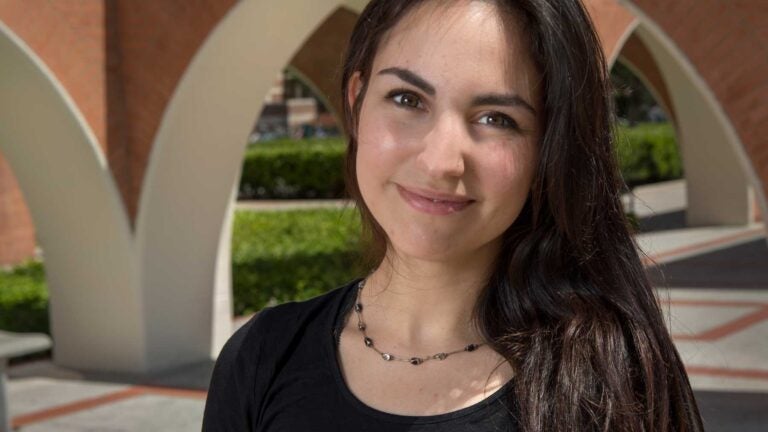
USC first generation international relations graduate Johanna Reyes will work on efforts to bring the U.S., Mexico and Cuba closer. (USC Photo/Gus Ruelas)
Globetrotting Trojan proves research isn’t just for grad students
Johanna Reyes is making an impact from Mexico to Cuba, and intends to do even more
When Johanna Reyes lists off the things she’s done while at USC, it’s hard to believe she’s only been here four years.
She’s traveled to Cuba to study revolutionary ideology, penned op-eds alongside faculty for The Washington Post, managed USC’s U.S.-Mexico Network and assisted Mexico’s former consul general in Los Angeles.
While hands-on research is a hallmark of graduate studies, Reyes – who will graduate May 12 majoring in international relations and the global economy and minoring in French – proves that it can just as attainable for undergraduates.
Reyes was raised in a suburb of Mexico City. Born to a Cuban mother and Mexican father, she didn’t move to Los Angeles until she was 13, when the recession forced the family business, a small market, to close.
“We lost everything,” Reyes, 22, said.
Feeling out of place
Showing up to her first day at a school in Los Angeles’ Los Feliz neighborhood, she felt out of place. She was told her English wasn’t good enough so they put her in the English as a Second Language program.
“When I came I thought I should be put at least a grade higher,” she said. “It felt like the foundations I got [at private school] in Mexico were a lot stronger.”
Over time, she enrolled in advanced placement classes, juggling extracurricular activities and mentoring.
While she quickly became an Angeleno, she felt there was a lumping together of Latino immigrants. She was documented – something made easier thanks to her mother’s Cuban citizenship – but she saw stereotyping of income, intelligence and background that she didn’t understand.
And that stayed with her.
It was during high school, while volunteering for the after-school theater program Inside Out, that she first walked on USC’s campus. She told a cousin that day that she’d go to USC.
The university ended up being an easy choice, with the cost of her education covered by Presidential and William and Sue Gross scholarships.
While she’s loved her classes, Reyes said it’s been her ability to do hands-on research as a undergraduate that’s really defined her time here at USC.
Off to Cuba
During her freshman year, she applied for USC Dornsife College of Letters, Arts and Sciences’ SURF program, a summer research grant, and ended up going to Cuba to interview people about the normalizing of U.S.-Cuban relations.
But it was in Paris for her spring semester, studying political science, when the desire to make an impact really hit her.
I felt I could do a lot more here. I really wanted to get involved with Mexicans in Los Angeles.
Johanna Reyes
“I think in Paris I really fell in love with my major. I felt I could do a lot more here,” she said. “I really wanted to get involved with Mexicans in Los Angeles.”
So she did just that. Upon arrival, she emailed Pamela Starr, the USC Dornsife associate professor of international relations whose U.S.-Mexico Network is a virtual hub for academics, journalists and others to share information about the two countries.
“I said, ‘I want to work for you,’” she said.
That turned out to be an important relationship. Starr introduced her to the consul general for Mexico in Los Angeles. She got a coveted gig for a college student, working one-on-one with the consul on a project called Mexico Innova, which highlights contributions of Mexicans in the U.S. Her interviews ended up forming a paper on changing the image of Mexico in the U.S., which was recently awarded a Discovery Scholar award.
“This was during the U.S. presidential campaigns, so a lot of horrible things were being said about Mexicans. … I realized that there is a huge number of successful Mexicans in Los Angeles who could speak out for those who couldn’t out of fear,” she said about working on Mexico Innova. “I thought their impressive career paths and accomplishments as immigrants could inspire younger Mexicans like me, and at the same time make a statement about how much we contribute to this country.”
She ended up helping the consulate turn it into a nonprofit and this year she was named its executive director.
Embassy work
It was that job at the consulate in Los Angeles that led her to going back to Cuba, getting a summer internship at the Mexican embassy and working with its agency on Mexico-Cuba trade. The idea was to get to Cuba so she could conduct research on communist ideology. After she’d get off work every day, she would interview former leaders and study in research libraries – the beginnings of her senior thesis.
It was also during that year she started working with Assistant Professor Benjamin Graham, researching developing countries like Libya and Cyprus for newspaper op-eds, a book and several academic papers.
“I never thought I could see my name next to someone’s I looked up to that much,” she said about being published working with Graham.
Reyes credits the USC Dornsife College for funding her research – whether through short-term grants, such as SURF, or through research assistant funding with Graham and Starr.
“I would not have been able to study at all – I mean at all – without the scholarships I got,” she said.
After graduation, she wants to take a year or two off from school, perhaps working for a think tank.
But she says, “I definitely want to get a PhD,” which means more of her favorite thing – research.
